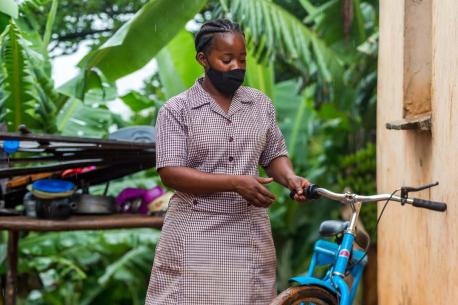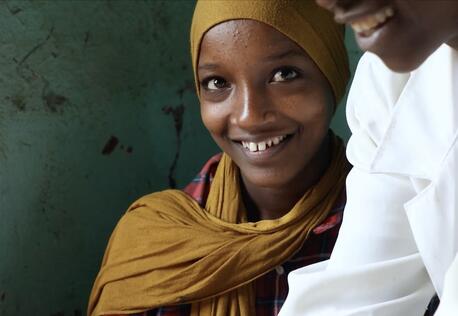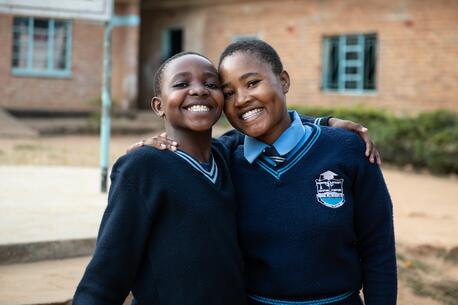
Health Workers Endure Rugged Treks to Help Every Child
Despite the challenges facing our world, frontline health workers are not giving up hope or their fight to care for mothers and children.
In Zimbabwe, communities located far from the nearest health facility rely on visits from village health workers like Miranda Muyambo, above, for the basic medical care and health information critical to their physical and emotional well-being. Maternal, neonatal and child mortality is still a major public health challenge in Zimbabwe, which has one of Africa’s highest under-5 mortality rates — 65 deaths per thousand.
But reaching mothers and children hasn't always been easy for Muyambo, who is responsible for families in southeastern Zimbabwe’s Chipinge district near the Mozambique border. When she first began her job, she had to trudge miles on foot to reach patients.
“The terrain is rough here, and some people live in places that are difficult to reach, but I have to reach them, so I walked," says Muyambo, who persevered over bush paths and up and down mountains on uneven dirt roads to make house calls. "It was tough.”
But now, reaching the 186 households in her territory with malaria testing kits, medical supplies and vital health advice is much easier. In April 2020, she was one of 400 village health workers to receive a bicycle from UNICEF, the World Bank and the Zimbabwe Idai Recovery Project (ZIRP), a joint initiative with UNICEF and other UN agencies to help communities struggling to recover from 2019's devastating Cyclone Idai.
“Without a bicycle, it was difficult to reach all targeted households," says Muyambo, who formerly spent much of her workweek traveling. "Now, I can cover at least 20 households in a single day and still find some personal time. Before, I would reach only six households. I used to walk for more than an hour to the hospital to collect supplies, submit reports or attend training. Now it takes just 15 minutes."
Integrating community health workers into formal health systems is critical to care reaching the ‘last mile.’ In 2020, supporting and training health workers like Muyambo is how UNICEF helped bring primary health care to remote communities overwhelmed by COVID-19. UNICEF is also working with countries to strengthen their health-sector supply chains and supply health workers with digital tools that enhance the quality of care. As the world continues to battle COVID-19, workers like Muyambo are vital to UNICEF's goal of achieving universal health care and ensuring that all communities can withstand future emergencies and pandemics.
"COVID-19 has reminded us how fragile our world can be. And how quickly all the systems that support children’s development and well-being can be overwhelmed and upended," said UNICEF Executive Director Henrietta Fore in her recent remarks at the annual meeting of UNICEF's executive board. "From health, nutrition, protection and education, to transportation and supply chains, to national economies and household incomes."
Through it all, health workers have gone the distance to rebuild faith in the world's health system one patient at a time. Meet three of the many healers who are making the world safer and healthier for children.
In Sierra Leone, a grocer by day and volunteer health worker by night makes house calls

When Sierra Leone recorded its first COVID-19 case in March of 2020, fear of the unknown virus undermined people’s trust in their health system. But thanks to community health workers like Adama Kamara, above, pregnant women and children continued to receive lifesaving care and attention.
“When COVID-19 broke out here, people became reluctant to go to health facilities for fear of being infected,” recalls Kamara, who works as a grocer by day, volunteer health worker by night. “I was also initially scared of catching the disease and spreading it while carrying out my duties, because I didn’t know much about it.”
UNICEF-supported training soon put her fears to rest. Kamara worked straight through the pandemic, taking all the necessary precautions so she could provide the primary care so many would have gone without if she hadn't visited them at home.
Before COVID-19 hit, Kamara screened babies for malnutrition and malaria herself. But once social distancing protocols went into effect, Kamara taught caregivers to do the hands-on work with her guidance and referred children she suspected of having malaria to the nearest health facility, where they could also receive their routine vaccinations. Kamara has also helped pregnant women feel more confident keeping up with their check-ups and delivering their babies at health centers.
Having two jobs sometimes makes Kamara's long trip home at the end of the day hard, but for her, the extra effort is worth it.
“I am very proud that I am contributing to the fight against maternal and under-five mortality in my country by helping children and their families stay healthy.”
A UNICEF grant helps a nurse bring health care to a village cut off by war in Yemen

In Al-Jarf, a small village in Yemen's Hajjah governate that's been largely cut off by conflict, 23-year-old Ashwaq Mahmoud AbdoQabul used a grant for community health workers to build the only health care facility for many miles around. AbdoQabul could have kept the UNICEF – European Union financial incentive for herself. But she didn't because in Al-Jarf, where she lives with 10 other family members, people haven't had medical care for years.
“The hospital is too far for people to get there, considering their condition,” AbdoQabul says of neighbors whose injuries and diseases have gone untreated. But when she first told her neighbors of her plan to build a primary care health center, they were skeptical. They remained wary even after the facility opened, so AbdoQabul went door to door, coaxing people to use the medical and immunization services.
But today, all that's changed. The village sheik backed her getting a nursing degree, and the community has finally grown accustomed to quality health care. Children suffering from malnutrition are getting treatment, and pregnant women are delivering healthy babies who are growing and thriving thanks to the protection offered by immunization.
Nurse-midwives in India ensure that a vaccine's journey ends with a child

Once vaccines arrive in India, they often have a long way to go to reach the children who need them.
Since 1978, India’s Universal Immunization Program has relied on auxiliary nurse-midwives like Heena Joshi (above) to ensure that the hard work of keeping vaccines safe and cold on their journeys pays off. Transporting vaccines isn't easy. Keeping them consistently cool is crucial to their effectiveness. That's no small feat in India, where they may travel by car, bike, boat or even camel to community health centers. Once they arrive, nurse-midwives like Joshi, who works in Dungarpur District in northern India's Rajasthan state, take it from there, leading immunization sessions at health centers and promoting vaccines' lifesaving benefits during home visits.
Nurse-midwives like Joshi — seen above during a house call to check a young pregnant woman's hemoglobin levels — perform other vital duties. With additional training, they can manage birth complications, make referrals to specialists when necessary, offer birth control counseling and provide supplemental nutrition to young children, teen girls and breastfeeding mothers.
Photos from top: Reaching the 186 households in her village close to Zimbabwe's border with Mozambique is now much easier for UNICEF-supported health worker Miranda Muyambo since she received a bicycle from UNICEF, the World Bank and the Zimbabwe Idai Recovery Project (ZIRP) in April 2020. © UNICEFZimbabwe/2021/Timothy Manyange; © UNICEF Sierra Leone/2021/Mason; © UNICEF/2021/Yemen/Essa Alrajehi; © UNICEF/UN0392251/Kolari
HOW TO HELP
There are many ways to make a difference
War, famine, poverty, natural disasters — threats to the world's children keep coming. But UNICEF won't stop working to keep children healthy and safe.
UNICEF works in over 190 countries and territories — more places than any other children's organization. UNICEF has the world's largest humanitarian warehouse and, when disaster strikes, can get supplies almost anywhere within 72 hours. Constantly innovating, always advocating for a better world for children, UNICEF works to ensure that every child can grow up healthy, educated, protected and respected.
Would you like to help give all children the opportunity to reach their full potential? There are many ways to get involved.





